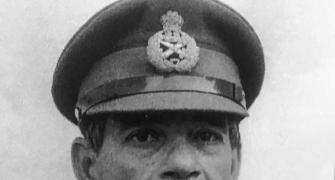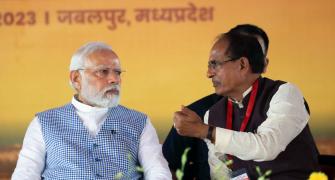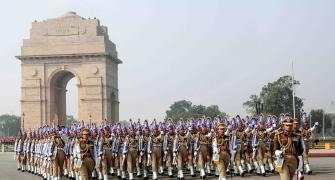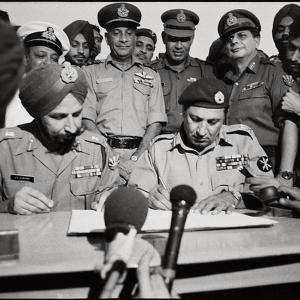Major General S C N Jatar, who passed into the ages on Monday night, thwarted anti-national forces at the peak of the Assam agitation.
Colonel Anil A Athale (retd) salutes this officer and gentleman.
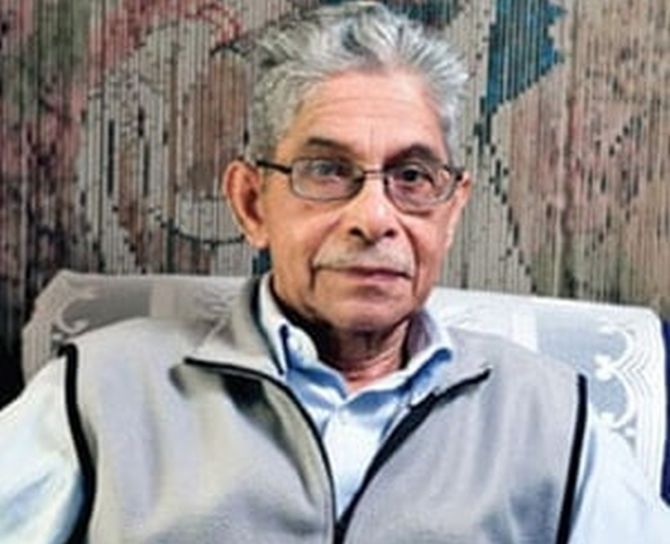
Major General S C N Jatar passed on to his next destination on the night of October 23, 2023, aged 91.
He defied the old adage that old soldiers never die, they fade away.
Sudhir, to his friends and admirers, was very active till almost the last two-three years when the Big C had him immobilised.
His achievements in service were indeed monumental and as a commanding officer of an Engineer regiment he did a great job in the 1971 War in clearing mines from a captured area of Punjab Hill in the Poonch-Krishna Ghati sector.
My association with him began with our think-tank Inpad (Initiative for Peace and Disarmament) in 1996.
Sudhir was one of the active members of the Express Citizens Forum that constructed the National War Memorial in Pune, now re-named the Southern Command War Memorial. His tireless efforts helped raise funds from the public for this effort.
Sudhir was an active concerned citizen and for a long time the moving force behind civic causes in Pune.
In 1979, he was seconded to Oil India as a general manager in the Assam oil fields. The oil pipeline was blockaded by miscreants during the Assam agitation.
It was critical that the oil flow was maintained else oil, that has a large wax content, would have frozen. That would have rendered the pipeline redundant, a major national loss.
Against stiff local opposition, Operation Indra Vajra was launched and the army took over the operation of the pipeline.
I was the staff officer who dealt with this issue at the Eastern Command headquarters.
At the peak of the Assam agitation, Oil India officers received many death threats and there was internal sabotage as well.
It is under these circumstances that Sudhir Jatar took over as general manager of Oil India and thwarted the designs of anti-national forces.
He is one of the unsung heroes of that difficult epoch in Assam's history.
Post-retirement from Oil India, General Jatar developed expertise in energy markets and was one of the foremost energy experts advising the government on energy policy.
He was chairman of the committee that surveyed the entire gamut of oil installations in India and recommended measures to safeguard them.
It is in large measure due to his work that despite many unknown efforts that our oil installations remained safe from 26/11-like terror attacks thanks to General Jatar's sterling work.
As another oil shock looms on the horizon, General Jatar's suggestions written nearly 15 years ago for Inpad (and reproduced below) are worth pondering.
Possible choices for India in view of the impending 'oil crunch'
A case for Oil Purchasing Rights (OPR)
Suggestions for a distinct, definitive leadership role internationally for India
Major General S C N Jatar (retd)
Petroleum is running out:
1. Petroleum is a finite resource. Its current rate of consumption (80 million barrels/day) is close to the production capability of the exporting countries.
The rate of growth of demand for imported liquid petroleum is around 2.5% + in the USA, just below 2% in Europe and Asian tigers, and considerably greater in China.
South Asia too has a high rate of growth, although the base level is low. The probability of finding giant oil fields is slim.
This would mean oil-exporting countries would not be in a position to increase their exports at 2% or more per year.
2. U.S. production peaked in 1970, Russia in 1986 and North Sea in 2003.
Chinese production would peak in 2005-2006, Mexico in 2007 and Canadian towards the end of this decade. OPEC production is likely to peak between 2025 and 2030.
Oil reserves are declining although production may rise. The reserves replacement ratio is now generally negative.
A worrisome scenario is by Duncan-Deffreyes that world oil production will reach its all-time peak in 2006.
Then from its peak in 2006 to 2040 world oil production will fall by 58.8%.
3. Oil and gas are running out faster than the vast majority of people realise and this will have seismic consequences for the whole world.
Even by the year 2005, oil will start to become in short supply, prices will start going up and politicians will opt for the nuclear energy option - with all the consequences that this option implies.
Oil shortages will surface, the Kyoto agreements will be impossible to follow and oil wars, which already span the globe, from Angola to Chechnya, will only get worse as the need for cheap oil will dominate the world's political agenda (The Final Energy Crisis, Edited by Andrew McKillop).
4. Liquid petroleum is likely to be the first area of crisis; natural gas could last (a decade or so) longer before supply limits the demand.
Natural gas is not easily stored and there are strategic reasons for not depending wholly on gaseous fuels.
High oil-price scenario
5. Unfortunately, the most oil-intensive countries (e.g. most developed nations) generally refuse to consider any reduction in their oil burn, or prefer, like the USA, to threaten oil-exporting countries with invasion, which in itself is a destabilising factor resulting in high oil prices.
Thus, the only countries able to increase their oil export supplies (mainly OPEC) are under political, financial and domestic pressures.
West Asia today is unbalanced because Iraq and Saudi Arabia are destabilised as a direct result of US invasion of Iraq.
6. Run-away oil prices would certainly precede the peak of net production of hydrocarbons because of physical shortage of oil and gas, and not necessarily due to the falling reserves that may not in the long term, satisfy world oil demand.
The industry would then abandon the present pricing system after the price reaches $100 per bbl.
Robert Mabro has discussed this possibility in the Oxford Energy Studies.
These radical thoughts have crossed Mabro's mind although he is a champion of the free market system.
India's role
7. India could play an enabling role to change attitudes and approaches to facilitate nations to make-do with lower consumption of hydrocarbons and to make it possible to transit smoothly to alternate fuels.
India is well placed for that role [large country, oil importer, fast economic growth, alert and intelligent mass media, broadly dispersed middle-class capable of adapting to new conditions and a track record of North-South initiatives.
The reformed system should permit poorer countries to obtain supplies of hydrocarbons at stable and predictable prices for sustained infrastructure development.
8. There are many national, territorial, political, ideological, trade and other disputes and differences between India, China and Pakistan, but their oil consumption per capita, although rising fast, is minuscule compared to USA, France, Japan, Germany and UK.
There are therefore good potentials for South-South cooperation and South-South initiatives for resolving the looming crisis.
The transition to alternate energy
9. Any sudden or rapid reduction in India's oil burn would be disastrous, both economically and socially.
This may not, however, be the case for EU countries, Japan or the Asian tigers (which could easily achieve a 30% reduction in per capita consumption within 1-5 years), or the USA (which could achieve a 50% reduction in per capita consumption before it approached European rates of consumption).
10. Reducing oil consumption rapidly of the most oil-intensive countries, will buy time to put energy transitions in place.
The Kyoto Treaty predicates large reduction of hydrocarbon consumption for countries, which have ratified the Treaty.
Oil Purchasing Rights (OPR):
11. India should evolve a system like the IMF Special Drawing Rights system (SDR) for world oil allotment, known as Oil Purchasing Rights (OPR).
The allotment of OPR would be depend on current oil-intensity, per-capita GNP, and energy needs, together with verifiable national plans for long-term reduction of oil-dependence and consumption.
For richer countries, OPR should additionally have a linkage to their Kyoto Treaty obligations.
The aim is to ration the limited global oil resources so that they last longer, are available at an affordable price and would give adequate time to develop alternate energy resources.
Rationing of oil should be on a global and organized basis, in a framework somewhat like the Kyoto Treaty.
We would then achieve peak consumption before peak production of hydrocarbons.
12. OPR would help conserve the remaining oil, and to use it, even in the long term, to produce essential chemicals and pharmaceuticals, and to build durable and sustainable infrastructure.
Colonel Anil A Athale (retd) is a military historian who has studied counterinsurgency in Kashmir, North East, Northern Ireland, South Africa and Sri Lanka. His earlier columns can be read here.
Feature Presentation: Rajesh Alva/Rediff.com

